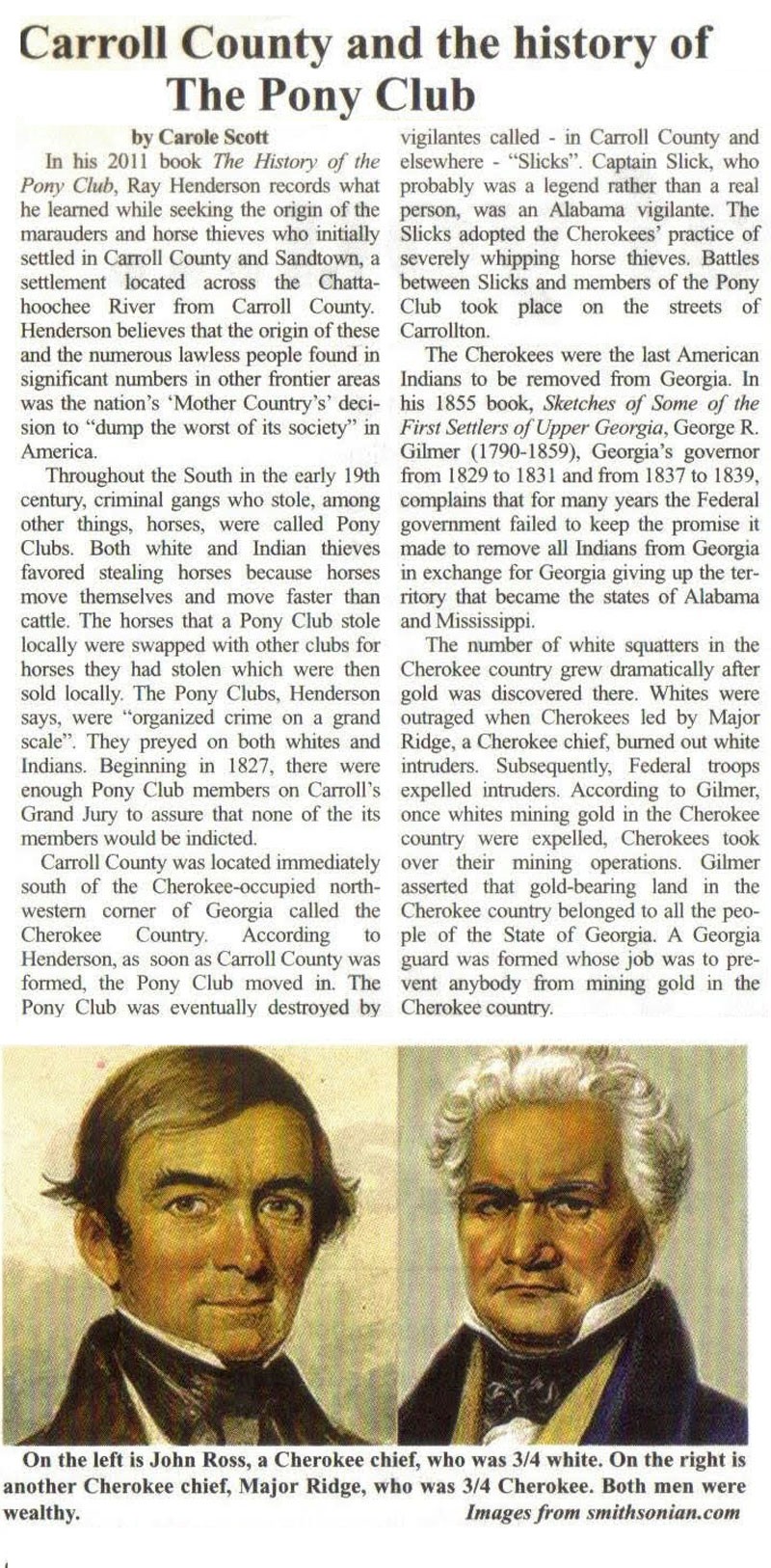In his 2011 book The History of the Pony Club, Ray Henderson records what he learned while seeking the origin of the marauders and horse thieves who initially settled in Carroll County and Sandtown, a settlement located across the Chattahoochee River from Carroll County. Henderson believes that the origin of these and the numerous lawless people found in significant numbers in other frontier areas was the nation's 'Mother Country's' decision to "dump the worst of its society" in America.
Throughout the South in the early 19th century, criminal gangs who stole, among other things, horses, were called Pony Clubs. Both white and Indian thieves favored stealing horses because horses move themselves and move faster than cattle. The horses that a Pony Club stole locally were swapped with other clubs for horses they had stolen which were then sold locally. The Pony Clubs, Henderson says, were "organized crime on a grand scale". They preyed on both whites and Indians. Beginning in 1827, there were enough Pony Club members on Carroll's Grand Jury to assure that none of the its members would be indicted.
Carroll County was located immediately south of the Cherokee-occupied north-western corner of Georgia called the Cherokee Country. According to Henderson, as soon as Carroll County was formed, the Pony Club moved in. The Pony Club was eventually destroyed by vigilantes called - in Carroll County and elsewhere - "Slicks". Captain Slick, who probably was a legend rather than a real person, was an Alabama vigilante. The Slicks adopted the Cherokees' practice of severely whipping horse thieves. Battles between Slicks and members of the Pony Club took place on the streets of Carrollton.
The Cherokees were the last American Indians to be removed from Georgia. In his 1855 book, Sketches of Some of the First Settlers of Upper Georgia, George R. Gilmer (1790-1859), Georgia's governor from 1829 to 1831 and from 1837 to 1839, complains that for many years the Federal government failed to keep the promise it made to remove all Indians from Georgia in exchange for Georgia giving op the territory that became the states of Alabama and Mississippi.
The number of white squatters in the Cherokee country grew dramatically after gold was discovered there. Whites were outraged when Cherokees led by Major Ridge, a Cherokee chief, burned out white intruders. Subsequently, Federal troops expelled intruders. According to Gilmer, once whites mining gold in the Cherokee country were expelled, Cherokees took over their mining operations. Gilmer asserted that gold-bearing land in the Cherokee country belonged to all the people of the State of Georgia. A Georgia guard was formed whose job was to pre¬vent anybody from mining gold in the Cherokee country.
Gilmer did not label as savages the Cherokees' part white chiefs. He was critical of white New Englanders who opposed the removal of the Cherokees from Georgia Indians, he observed, had much earlier been forced out of New England. Supported by missionaries from New England and represented by a lawyer related to Gilmer by marriage, the Cherokees decided to attempt to get the U.S. Supreme Court to issue a ruling that would establish what Gilmer labeled a foreign nation in Northwest Georgia. Such a ruling, he asserted, would violate the sovereignty of the State of Georgia and would represent a dangerous assumption of power by judges.
The Supreme Court came down on the side of the Cherokees, but President Andrew Jackson -no friend of the Indian- left it up to the court to enforce its ruling, which it did not have the means to do. The Cherokees remaining in Georgia were forcibly moved west of the Mississippi River in 1838. A great many of them died on what they called the "Trail of Tears". Under the leadership of Cherokee chiefs John Ross and Major Ridge, before the Cherokees were forced to leave Georgia, they largely adopted the culture of white Georgians, including black slavery, and to gain whites' favor helped them fight the Creeks.
Ridge adopted his U.S. Army rank as a white-style, first name. Until the end of the Chickamauga Wars, he was known as Nunnehidihi, meaning "He Who Slays The Enemy In His Path.". For most of his later life, he was named Ganundalegi (other spellings include Ca-Nun-Tah-Cla-Kee, Ca-Nun-Ta-Cla-Gee, and Ka-Nun-Tah-Kla-Gee), meaning "The Man Who Walks On The Mountain Top."
Unlike Ross, Ridge eventually con-cluded that it was futile to continue to resist removal. He was murdered for advo¬cating the Cherokees leave Georgia. Half-white Creek Chief McIntosh was mur¬dered at his Carroll County home for agreeing to the removal of his tribe.
- Carole Scott

